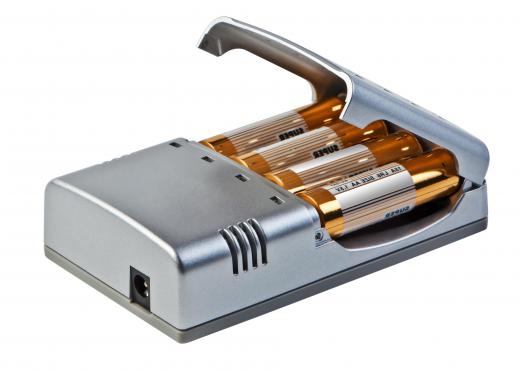What is a Silver-Oxide Battery?
A silver-oxide battery is a long-lasting and high-energy power cell. These batteries are also called silver-zinc batteries because they are typically composed of silver-oxide, which is used as the positive electrode, and zinc, which is used as the negative electrode. Either sodium hydroxide or potassium hydroxide generally serves as the alkaline electrolyte.
The electrolyte that is used matters because it determines the battery’s current-carrying capabilities. Potassium hydroxide allows a silver-oxide battery to operate more efficiently under heavy draining circumstances. A disadvantage to using potassium hydroxide is that it tends to make the battery harder to seal. This means that batteries containing sodium hydroxide are generally more salt resistant.

Batteries containing both types of electrolytes typically perform well at extreme hot and cold temperatures. Those containing potassium hydroxide can operate at lower temperatures than their counterparts. Those containing sodium hydroxide have been found to experience greater amounts of efficiency losses in extreme cold.
When compared to other types of energy cells, silver-oxide batteries offer a range of advantages. These vary depending on which type of energy cell it is compared to. When compared with a mercury battery, the silver-oxide battery generally offers higher flat operating voltages. When compared with an alkaline battery, the silver-oxide battery has a flatter discharge curve. Even lithium-ion batteries are overshadowed by the tendency for silver-oxide batteries to have a substantially greater run-time.
These batteries are available in a range of sizes. Some are on the retail market for general consumers. The larger varieties of these batteries are generally not the most popular batteries for consumer purchase because they tend to be more expensive than many of the other options. Much of the expense is due to the price of silver.
The smaller button cell silver-oxide batteries, however, which can be used in items such as watches and calculators, use only small amounts of silver. Their prices are therefore not as greatly affected, so they tend to be considered more affordable. Silver-oxide batteries of this size are very popular and widely used in a number of devices.
The high-quality performance of these batteries has prompted some users to ignore costs and have silver-oxide batteries custom built. The US military has used them for power in torpedoes and in submarines. They were also used extensively in the Apollo space program.
A silver-oxide battery generally has a life span that ranges from three to five years. After that, they may begin to leak. These batteries are not considered environmentally friendly and can be hazardous to the environment or to a person’s health, depending on the battery's condition. They should be discarded according to hazardous material standards.
AS FEATURED ON:
AS FEATURED ON:











Discussion Comments
There is actually a growing market in many eastern countries for people to take apart the scraps of electronics to find these precious metals; the unfortunate thing is that these jobs then result in an overexposure to radiation and chemicals which are harmful to people. It is also not a well paid job, it is just a way to get money for some people who otherwise can't; how unfortunate that such labor is one of the few ways the western world can find to pick up its trash.
When you consider how often these days there are silver, gold, or other precious metal in electronics, from a computer battery pack to even a silver oxide watch battery, it is very sad how often people throw these things away, causing us to lose those precious metals.
Post your comments